International Technical Support Newsletter No 22, July 2024
- Introduction of ERETES in four countries in Africa and Latin America
- Initial experimentations of the new version of ERETES in the pilot countries
- The development of national accounting expertise and methodology in Tunisia and Morocco
- A major step in the finalisation of the MINAC Macroeconometric Model in Morocco
- Welcoming delegations from Algeria, Tunisia and South Korea
- Support for official statistics in Mauritania continues
- A regional workshop promotes the sharing of experiences and practices in connection with quality in Africa
- The PASII - ECOBUSAF and SOCSTAF cooperation projects
- Virtual workshops on the Tourism Satellite Account
- “African Agriculture’s Exposure to Climate Change” Hackathon - And the winners are...
- Communication regarding the ECOBUSAF and SOCSTAF projects
Introduction of ERETES in four countries in Africa and Latin America
Four missions were carried out in the first quarter of 2024 to install the Ouvrir dans un nouvel ongletERETES software, which is used to compile national accounts. They took place in four countries and in three different languages:
- in French, in Tunisia and Madagascar;
- in English, in Liberia; and
- in Spanish, in Bolivia.
While the transfer of skills is already well under way in Tunisia, it was only the second mission in Liberia and the very first one in Bolivia and Madagascar.
The missions in Africa took place as part of the ECOBUSAF component of the Pan African Statistics Programme II (Ouvrir dans un nouvel ongletPASII) funded by the European Union. The first mission to Madagascar was conducted jointly by INSEE and Ouvrir dans un nouvel ongletAfristat, with the goal of assessing Madagascar’s national accounts production system before updating the benchmark year, migrating to the 2008 System of National Accounts (SNA) and adopting the ERETES software.
The mission in Bolivia is part of an ambitious project aimed at modernising national accounts and financed by France via the Ouvrir dans un nouvel ongletAgence française de développement. In order to confirm the requirements and timetable, and to formalise the participation of experts from the Peruvian National Institute of Statistics, the project manager (Vincent Biausque from the INSEE Ile-de-France Regional Office) also made the trip. After Brazil and Peru, Bolivia will be the third country of Latin America to use ERETES.
Cooperation with this new country provides the project stakeholders with an opportunity to discover the Latin American economy and culture, together with new data processing processes, as well as to strengthen their language skills, given that discussions with the Bolivians and Peruvians are held in Spanish.
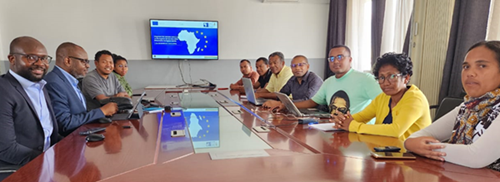
Harouna Traoré (Insee), Ibrahima Sory (Afristat) (first and second from the left)
and part of the Madagascan INSTAT national accounts team
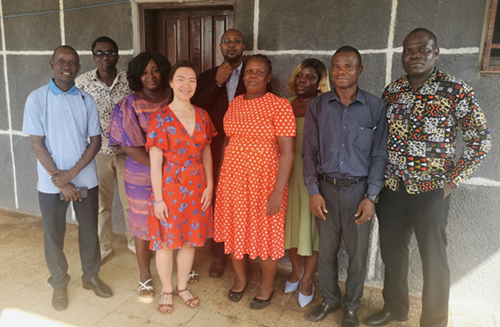
Alice Tchang (Insee), Erith Nghogue (the NSO of Cameroon) (fourth and fifth from the
left)
and part of the Liberian national accounts team
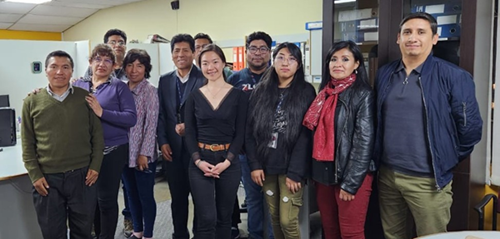
Alice Tchang (INSEE, fifth from the right) and part
of the Bolivian national accounts team
Initial experimentations of the new version of ERETES in the pilot countries
As part of the update of the ERETES tool, which is part of the ECOBUSAF-PAS II programme, INSEE carried out two initial missions to Cameroon and Cabo Verde in order to test some of the new functions that will soon be available in the software.
The mission carried out at Ouvrir dans un nouvel ongletthe INS of Cameroon concerned the functions required to produce financial and non-financial balance sheets in ERETES. The availability of these new tools will increase the functions offered by the software and meet all the requirements set by international organisations.
The mission at Ouvrir dans un nouvel ongletthe NSO of Cabo Verde involved testing the new tools that will simplify the process of balancing resources and uses, that accountants perform for each good or service available within a national economy. The various pre-defined models for semi-automatic balancing will allow for faster estimates of the supply and demand approaches of gross domestic product (GDP).
These missions enabled the collection of opinions of experienced users in order to improve the functions before the release of the new version of ERETES, which is scheduled for the first half of 2025.
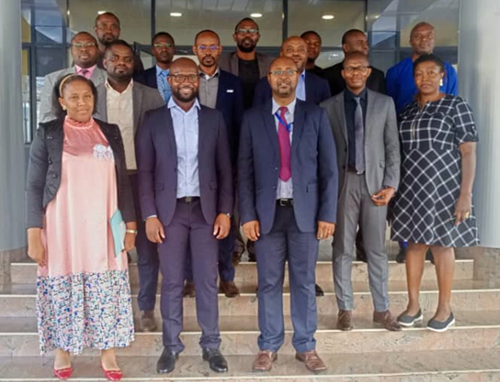
Harouna Traoré (INSEE, front row, second from the left)
and part of the national accounts team of the NSO of Cameroon
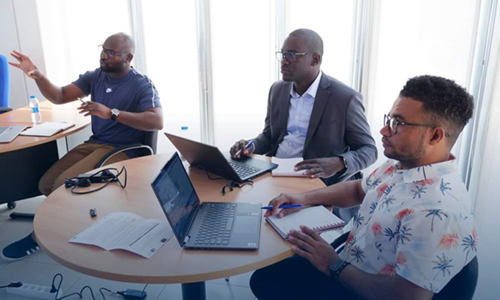
From the left: Harouna Traoré (INSEE),
Khadim Sourang (National Agency for Statistics and Demography of Senegal) and
José Dos Santos Fernandes (NSO of Cape Verde)
The development of national accounting expertise and methodology in Tunisia and Morocco
New ground has been broken in the ongoing projects on the expansion of national accounting in North Africa. Two missions, one in Tunisia and another in Morocco, have led to significant progress in incorporating balance sheets into national accounts, setting up a satellite account for the digital economy and preparing for the adoption of the 2025 SNA, in particular. By taking specific national factors into account while also noting regional similarities, bespoke expertise and support methodology are being developed. In this context, INSEE will support the establishment of a lasting collaboration between the NSI of Tunisia and the High Commission for Planning of Morocco, which we hope will be as productive as possible for both parties.

Pierre Muller (retired INSEE national accounts expert, first from the right)
and part of Morocco’s national accounts team
A major step in the finalisation of the MINAC Macroeconometric Model in Morocco
A long-term collaboration between INSEE and the High Commission for Planning of Morocco is aiming to build a macroeconometric model providing quarterly forecast for the Moroccan economy. Now, after regular remote support and a second mission in May, the model is operational for the second half of 2024 and will be tested before receiving final approval by the end of the year.
Welcoming delegations from Algeria, Tunisia and South Korea
In the first half of 2024, three delegations were welcomed to the Directorate-General for activities relating to international technical cooperation:
- Algeria: in January, as part of the European Padica project, the collection and use of company data and classifications were presented to a delegation from the Algerian Ouvrir dans un nouvel ongletMinistry of IndustryMinistry of Industry and Pharmaceutical Production.
- Tunisia: representatives from the Ministry of Economy and Planning, the Tunisian Institute of Competitiveness and Quantitative Studies (Ouvrir dans un nouvel ongletITCEQ) and the NSI of Tunisia,Ouvrir dans un nouvel ongletStatistiques Tunisie, were welcomed for discussions on public policy insights, contributions to the public debate on economic issues and relations between expert organisations focusing on economics. The Director-General of INSEE met them to discuss the report to the French Prime Minister entitled Ouvrir dans un nouvel ongletAnalyse économique et évaluation des politiques publiques (Economic Analysis and Evaluation of Public Policies) by Jean-Luc Tavernier and Nicolas Véron. The Tunisian delegation also held discussions with the head of the Statistical Coordination mission. This visit was organised in February as part of the European Ouvrir dans un nouvel ongletSavoirs Eco (Eco Knowledge) project in Tunisia, of which INSEE is a stakeholder.
- South Korea: led by its Director of Planning and Finance, a delegation from the South Korean Institute of Statistics (Ouvrir dans un nouvel ongletKOSTAT) was welcomed in April by the head of the Financial affairs department and his team to benefit from INSEE’s experience in performance management. Although collaboration with KOSTAT is not very frequent, visits of this kind happen regularly every two years (in 2016, on the updated census, in 2018, on the SILC survey and the measurement of income inequality and, most recently, in 2022, on HR mobility and management).
Support for official statistics in Mauritania continues
INSEE’s activities aimed at strengthening the statistical capabilities of Mauritania’s National Agency for Statistics and Demographic and Economic Analysis (Agence Nationale de la Statistique et de l’Analyse Demographique et Économique – Ouvrir dans un nouvel ongletANSADE) are continuing in 2024: led by its Director-General, a delegation from ANSADE was welcomed in Montrouge from 13 to 15 February. Discussions with INSEE’s various departments covered multiple topics, including communication, economic outlook, coordination within the Official Statistical System and work planning. Regional action and dissemination, the main focus of a mission to Mauritania made by three INSEE experts and the project’s senior advisor from 15 to 19 April, were also discussed during this visit.
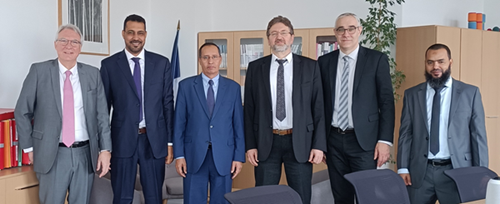
From left to right: Jean-Michel Durr (Senior Project Advisor), Mohamed El Moctar Ould,
Ahmed Sidi and Taleb Abderrahmane Ould El Mahjoub (ANSADE), Pascal Rivière and
Olivier Biau (INSEE),
and Mohamed Aly Sidi Mahmoud (ANSADE)
A regional workshop promotes the sharing of experiences and practices in connection with quality in Africa
INSEE, Afristat and Ouvrir dans un nouvel ongletthe National Institute of Statistics and Demography of Benin jointly organised a regional workshop in Cotonou from 20 to 24 May. It was attended by representatives of eight African national institutes of statistics and two regional central banks (of West Africa and Central Africa). This event not only underlined the importance of quality in African Official Statistics, but also confirmed the differences between countries and institutions, as well as implementation methods and strategies based on specific national traits and available resources. This workshop was organised with the goal of facilitating the creation of a network of quality focal points, coordinated by Afristat, and the continuation of the ongoing work in the various countries represented. These two objectives were restated at the close of the workshop.
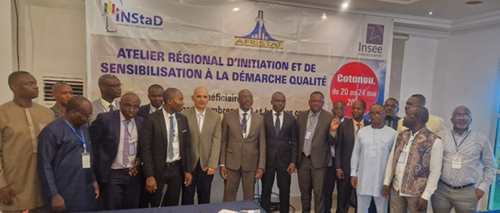
Participants in the Cotonou quality workshop; Mahmoud Jlassi (INSEE, first row, fourth from the left)
The PASII - ECOBUSAF and SOCSTAF cooperation projects
These projects, funded by the European Union, have now entered their active phase. In addition to the national accounts support missions carried out in sub-Saharan Africa already mentioned in this letter, several other flagship activities were successfully carried out by INSEE in relation to these projects during the first quarter of 2024.
Virtual workshops on the Tourism Satellite Account
On February 19th and 22nd, two online workshops were held on the tourism satellite account for African Union member states: one for English-speaking countries and the other for French-speaking countries. These workshops were organised jointly by INSEE, Statistics Norway and Statistics Denmark.
Along with representatives from Statafric and Afristat, a total of 70 statisticians from 23 African Union member states participated in one of these workshops.
The topics covered included the method used to create the tourism satellite account, the sources used, the main tables of the account and the potential difficulties. Eight participating countries also shared their experiences. In conclusion, Statafric emphasised the importance of implementing a tourism satellite account and stressed the importance of it being constructed with Africa in mind. This point will be addressed during a workshop organised in Tunis, in October.
“African Agriculture’s Exposure to Climate Change” Hackathon - And the winners are...
INSEE, and in particular the SSP Lab, organised a hackathon with contributions from experts from Statistics Poland, Statistics Finland, Statistics Norway, members of the ECOBUSAF and SOCSTAF consortia, as well as from the National Institute of Statistics of Rwanda, ISSEA (Yaoundé) and the United Nations Economic Commission for Africa. The exercise was based on data from the 2019 agricultural census carried out by the Directorate of Agricultural Statistics of Benin.
Ten teams from national institutes of statistics of African Union member states participated in the competition, which was held on April 8th and 9th , and worked on a topical subject: “African Agriculture’s Exposure to Climate Change”. The countries represented were: Algeria, Burkina Faso, Cameroon (two teams: one from the NSI, the other from MINADER, the Ministry of Agriculture), Côte d’Ivoire, Gabon, Nigeria, Namibia, Somalia and Togo. A mentoring process, relying in particular on experts from Statistics Poland and the Directorate of Agricultural Statistics of Benin, was organised during the event to answer the technical questions raised by the participants.
The aim of this hackathon was to raise awareness among experts from NSIs of African Union member states regarding the use of new administrative and private data sources
At the end of the competition, the judging panel met on April 16th and declared the hackathon winners to be the teams from the NSIs of Nigeria and Côte d’Ivoire. These two teams stood out for the quality of their work: original presentation of findings, use of external sources, innovation, modelling, etc. They will be invited to a study visit to INSEE to attend a presentation on the work of INSEE and the Ministerial Statistical Departments on new data sources and the processing thereof. They will also have the opportunity to present the solutions proposed as part of the hackathon and consider their implementation.

The Nigeria team: from left to right, Sandra Ben-Ezea, Omokhomion Emmanuel,
Bishop Ohioma, Elizabeth Olarewaju, Lucky Ogidan and Moses Waniko;
the dashboard of their work

The Côte d’Ivoire team: from left to right, Ehou M’Boya Koto, Koto Mathias Doueu,
Obou Wilfried Sibahi, Abdoulaye Bakayoko, Abdoul Karim Camara and Kô Fié Didier
Kraet;
an illustration of their work (map of sorghum growers)
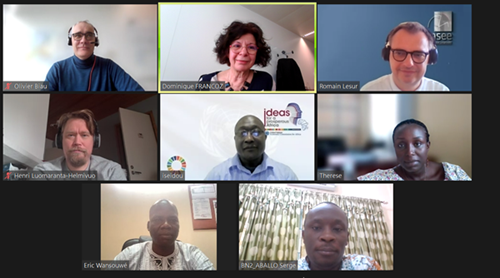
The judging panel: from left to right and top to bottom, Olivier Biau, Dominique Francoz
and Romain Lesur (INSEE), Henri Luomaranta (Statistics Finland), Issoufou Seidou
(UNECA),
Thérèse Uwimana (NISR Rwanda), Eric Wansouwe (ISSEA Yaoundé) and Serge Aballo
(NSI Benin)
Communication regarding the ECOBUSAF and SOCSTAF projects
The two consortia PASII-ECOBUSAF et PASII-SOCSTAF participated to the European Conference on Quality in Official Statistics Q2024 (Ouvrir dans un nouvel ongletEstoril) presenting a poster on the contribution of the two projects to developing capabilities in Africa. This presentation was an opportunity to highlight the issue of improving quality in the statistical institutes of African Union member states with which the members of the European consortia cooperate, regardless of the field in which they are providing support. A mid-term review demonstrates the high level of interest among African Union member states in participating in this programme (technical support and training organised by the French, Spanish and Polish NSIs), followed by more countries than initially planned.
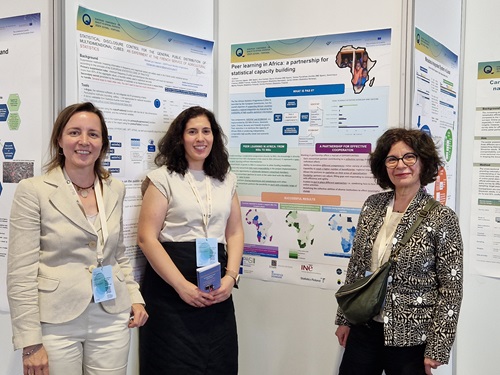
From left to right: Ana Carmen Saura and Ana Canovas (INE, Spain), Dominique Francoz (INSEE)
The consortia members also drafted a leaflet presenting the two programmes and a semi-annual newsletter highlighting outstanding activities already implemented and listing those planned for both projects. It is available on the INSEE website in French and in English.


